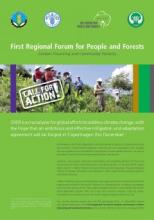Land Library Search
Through our robust search engine, you can search for any item of the over 73,000 highly curated resources in the Land Library.
If you would like to find an overview of what is possible, feel free to peruse the Search Guide.
/ library resources
Showing items 1 through 9 of 14.Thousands came together in "Hopenhagen" from 7-18 December 2009 for what was the most covered and talked about of any United Nations Framework Convention on Climate Change (UNF CCC) Conference of the Parties (COP) to date.
Report by the Rural Research & Development Training Center on the impacts of land and forest policies on the livelihood of ethnic minorities.
This report aims to evaluate the economic, social and ecological impacts of large-scale land concessions to plant rubber and make recommendations for the future management of land in Lao PDR. Study focused on Champassak and Salavane provinces from July 2007 to July 2008.
Hosted in Hanoi, Vietnam, from 18 to 20 August 2009, the First Regional People and Forests Forum on Carbon Financing and Community Forestry brought together more than 80 people from 12 countries, including key government, civil society, private sector, and international organization participants.
The Bali Action Plan identified two key areas for the forest sector to contribute significantly to global climate change mitigation. One area concerned approaches and incentives relating to reducing emissions from deforestation and forest degradation in developing countries (REDD).
This bulletin draws on country-level experience to share civil society perspectives on the challenges, opportunities, and possible approaches for pro-poor REDD.
The 450 million people living in and around Asia-Pacific forests hold a vital stake in the success of REDD. For effective reductions in emissions from deforestation and forest degradation, such schemes must:
Local people hold the key to healthy forests, and if forest carbon-financing schemes are to succeed, they must actively engage and benefit these crucial stakeholders.
In many areas within the Asia-Pacific region, there are compelling short-term incentives to degrade or to convert forestland for other uses.








